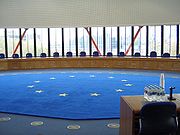European Court of Human Rights Issues Decision in Masaev v. Moldova

May 2009 – Strasbourg
In a decision issued 12 May 2009, the European Court of Human Rights reiterated that freedom of thought, conscience and religion is one of the foundations of a “democratic society” within the meaning of the Convention. It determined that the actions of the Moldovan authorities in charging, convicting and fining the applicant, a Muslim, for praying inside his home because Islam is not a registered religion constituted an interference which did not correspond to a pressing social need and was therefore not necessary in a democratic society. In Masaev v. Moldova, Masaev, together with a group of other Muslims, was praying on private premises, namely in a house rented by a non-governmental organization, when Moldovan authorities entered the house. The occupants were dispersed by the police and the applicant was subsequently charged with the offence of practicing a religion which was not recognized by the State. Masaev was subsequently convicted and fined. Masaev submitted that these actions constituted an impermissible interference on his right to manifest his religious beliefs as guaranteed in Article 9. The Moldovan authorities acknowledged the interference, but stated that such actions were prescribed by law and served a legitimate purpose. The claimed that requiring religious organizations to register prior to conducting religious activities was necessary to insure that these activities were not harmful to the general population. Therefore, any judicial action taken to enforce these purposes is appropriate. The Court reiterated the importance of “the need to maintain true religious pluralism, which is inherent in the concept of a democratic society,” and determined that the law at issue, while pursuing a legitimate purpose of preserving public order, “did not correspond to a pressing social need and was therefore not necessary in a democratic society.” The Court acknowledged the authority of the state to require religious organizations to register, but this power did not extend to sanctioning individual members for manifesting their religious beliefs. The Court said that “to admit the contrary would amount to the exclusion of minority religious beliefs which are not formally registered with the State and, consequently, would amount to admitting that a State can dictate what a person must believe.”